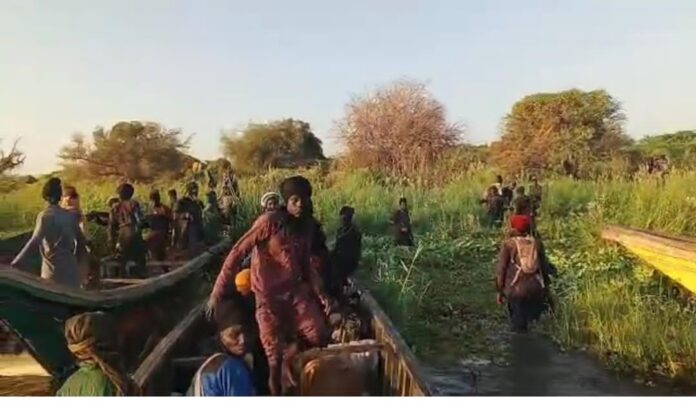By: Abdullahi Inuwa
Fresh hostilities have erupted in the Lake Chad region as deadly clashes between rival terror groups — Boko Haram’s Jama’atu Ahlis Sunna Lidda’awati wal-Jihad (JAS) faction and the Islamic State West Africa Province (ISWAP) — left dozens of fighters dead, following the collapse of a fragile peace pact between the two camps.
According to reports by counterinsurgency expert Zagazola Makama, the renewed fighting marks the breakdown of a short-lived truce that had temporarily halted years of internecine warfare between the groups.
Sources revealed that the latest confrontation stemmed from the killing of Abu Abass, a senior tax collector under the Bakoura-led JAS faction, allegedly executed by ISWAP fighters in September. His death reportedly enraged Bakoura’s loyalists, triggering a series of reprisal raids targeting ISWAP-controlled territories.
The most recent clash occurred on Saturday, October 26, when forces loyal to Mohammed Hassan, a key commander under Bakoura, launched a coordinated assault on an ISWAP stronghold at Mangari, in Kukawa Local Government Area of Borno State.
The attack, carried out between 5 p.m. and 8 p.m., saw JAS fighters advancing from Toumbun Gini towards Abujan Ruwa, using multiple watercraft to strike ISWAP’s defensive positions. Field reports indicate that dozens of ISWAP militants were killed, with the JAS faction seizing weapons, ammunition, and supplies.
“The Bakoura-led faction overpowered ISWAP during the offensive and captured several of their weapons and equipment,” a source told Zagazola. “Casualty figures could rise as both sides continue to mobilize reinforcements around the Lake Chad islands.”
The renewed fighting is believed to be a continuation of earlier attacks carried out on October 8, when Bakoura’s men overran ISWAP positions in Toumbun Mairi, inflicting heavy casualties.
“The Bakoura faction has vowed to avenge the killing of its commanders,” another source disclosed. “They accuse ISWAP of betrayal after both groups agreed to suspend hostilities in a bid to focus on fighting security forces.”
In response, ISWAP leaders have reportedly ordered all field commanders to regroup for major counterattacks aimed at wiping out Boko Haram remnants in their zones.
The rivalry between JAS and ISWAP has long been marked by extreme brutality, with both factions engaging in cycles of vengeance that often spill over into civilian communities. Locals living near the Lake Chad Basin are said to be fleeing renewed violence as the insurgents fight for control of fishing hubs, smuggling routes, and taxation points.
Since the death of Boko Haram’s leader Abubakar Shekau in 2021, the jihadist movement has splintered into multiple factions, each vying for dominance. While ISWAP gained the upper hand in recent years, the Bakoura-led JAS group has maintained a significant presence in parts of Kukawa, Abadam, and Marte areas, operating from hard-to-reach islands along the Lake Chad fringes.
Analysts warn that the resurgence of inter-factional fighting could weaken both groups militarily, but may also increase attacks on civilians as each side attempts to replenish resources and assert authority.
In the wake of the clashes, troops of Operation Hadin Kai have been placed on heightened alert across the North East. Military sources confirmed that surveillance operations are ongoing to identify terrorist movements and prevent infiltration into civilian settlements.
Security forces have intensified air reconnaissance and ground patrols in the Lake Chad Basin, where both Boko Haram and ISWAP maintain secret camps and arms depots.
The renewed infighting, according to experts, underscores the fragile and volatile nature of the insurgency in the region. Despite the Nigerian military’s recent successes, the Lake Chad islands remain a critical battleground for supremacy among extremist factions.
“The collapse of the reconciliation deal has plunged the terrorists back into an all-out war,” Zagazola noted. “This internal bloodletting may momentarily weaken their structure, but it also raises the risk of desperate attacks on soft targets.”
As both groups trade blows in their bloody rivalry, the humanitarian implications continue to mount, with thousands of displaced civilians now trapped between warring factions and struggling to survive amid worsening insecurity in the Lake Chad Basin.




